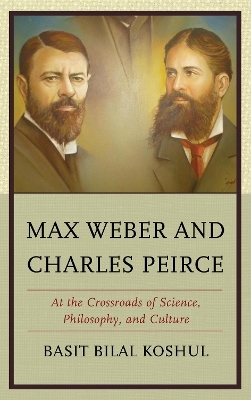
Max Weber and Charles Peirce
Lexington Books (Verlag)
978-0-7391-7800-3 (ISBN)
Max Weber and Charles Peirce: At the Crossroads of Science, Philosophy, and Culture shows that a relational conception of science is implicit in Max Weber’s reflections on scientific inquiry as a bridge between the Geisteswissenschaften (soft sciences) and Naturwissenschaften (hard sciences). Because he is not a trained philosopher, Weber does not have the precise philosophical language in which to articulate his ideas clearly. Consequently, his relational vision of science remains obscure. Basit Bilal Koshul brings clarity and precision to Weber’s insights using the pragmaticist philosophy of Charles Peirce. He makes explicit the phenomenology, semiotics, and logic that are implicit in Weber’s methodological writings and translates them into Peircean terms. Since Peirce explicitly offers his philosophy of science as a critique of the modern divide between the humanistic and natural sciences and of the divide between religion and science, this translation has a double effect. It clarifies Weber’s insights on the methodology of scientific inquiry, and it extends the reparative force of these insights into the larger culture of which science is one part. The reconstruction of Weber’s relational conception of science along the lines of Peirce’s pragmaticism, in turn, reveals that Weber’s work points toward deep affinities between religion and science. Given the fact that the same phenomenology, semiotics, and logic that underpin Peirce’s philosophy of science are also at the root of his philosophy of religion, we can begin to appreciate the fact that Weber’s work makes an important contribution to bridging the divide between religion and science. In providing models that bridge divides and move towards complementary relationships, Weber and Peirce not only help us to better understand disenchantment as the fate of our times, but also offer uniquely valuable resources to reach for cultural horizons that lie beyond it.
Basit Bilal Koshul is associate professor at the Lahore University of Management Sciences (LUMS) in Lahore, Pakistan. After teaching at Concordia College in Moorhead, MN for four years, he joined the Department of Humanities and Social Sciences at LUMS in 2006. The focus of his research is to recover the neglected resources in modern thought and religious tradition (especially scripture) that can help to transform the mutually debilitating dichotomies of religion/science, North/South, West/Islam, economics/ethics, security/rights etc. into mutually enriching relationships. He sees the work of Muhammad Iqbal, Charles Peirce, and Max Weber, individually but much more so collectively, as a promising starting point for initiating the transformation of divides into relationships.
Acknowledgments
Abbreviation of Weber’s Works
Introduction
Chapter One: Causality and Scientific Inquiry
Chapter Two: Weber’s Conception of Causality: A Reconstruction
Chapter Three: The Significance of Concept Formation
Chapter Four: Weber on Concept formation: A Reconstruction
Chapter Five: Conceptual Apparatus and the Logic of Scientific Inquiry
Chapter Six: The Cultural Significance of Weber’s “Wissenschaftslehre”
Chapter Seven: Weber, Peirce, and a Relational Vision of Religion and Science
Bibliography
| Verlagsort | Lanham, MD |
|---|---|
| Sprache | englisch |
| Maße | 163 x 240 mm |
| Gewicht | 481 g |
| Themenwelt | Geisteswissenschaften ► Philosophie ► Logik |
| Geisteswissenschaften ► Philosophie ► Philosophie der Neuzeit | |
| ISBN-10 | 0-7391-7800-8 / 0739178008 |
| ISBN-13 | 978-0-7391-7800-3 / 9780739178003 |
| Zustand | Neuware |
| Haben Sie eine Frage zum Produkt? |
aus dem Bereich


